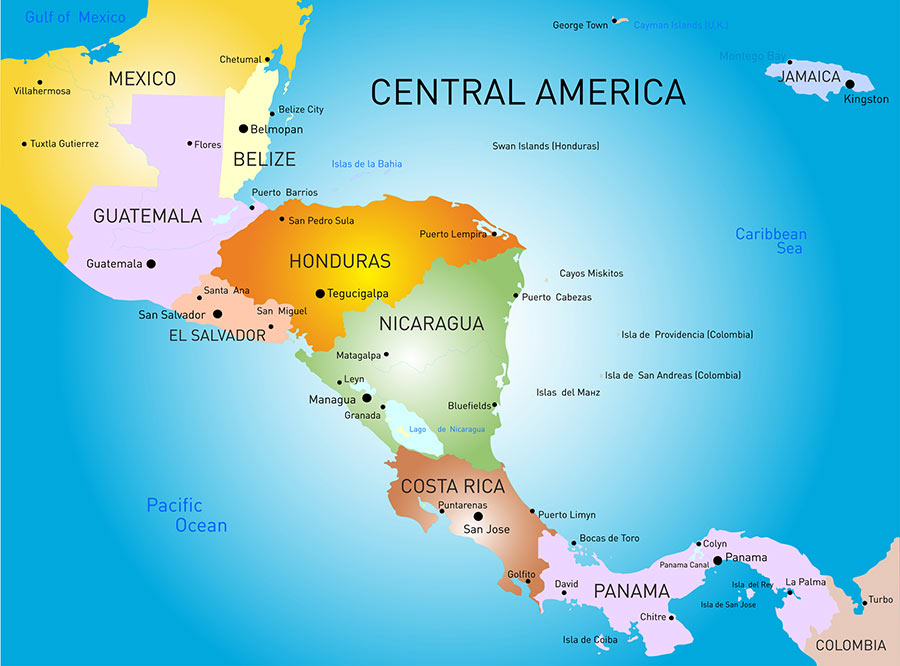Nicaragua Joins China’s Belt And Road Initiative
Just a month after Nicaragua switched its recognition of the Chinese government from Taipei to Beijing, the two countries have signed several key agreements underpinning their new political relationship, including an MoU with China’s Belt and Road Initiative.
A range of bilateral treaties were signed by Nicaraguan and Chinese representatives in Managua, the Venezuelan capital last week, ahead of Nicaraguan President Daniel Ortega’s inauguration for a fourth term as president.
The documents included a political consultation agreement, a treaty on bilateral cooperation and diplomacy, a memorandum of understanding on cooperation under the framework of the Belt and Road Initiative and the 21st Century Maritime Cooperation, and the mutual waiver of visas for Chinese and Nicaraguan citizens carrying diplomatic passports or traveling for official business.
Ortega’s democratic socialist Sandinista National Liberation Front (FSLN) has long pursued social programs in the impoverished Central American country despite extensive resistance by the United States, including funding a ten-year proxy war against Ortega’s government in the 1980s that eventually forced him from power in 1990. After this, a new era of US-directed neoliberalism created special export zones for shipping duty-free goods to the US. It created free trade zones in which up to 20% of Nicaragua’s formal sector workforce is employed by local contractors who sell their manufactured goods to US corporates such as Wal-Mart, VF Jeans, Levi Strauss, Tommy Hilfiger, Nike, and Gap. However, wages were kept low, while Nicaraguan commodities were sold at low prices to be resold at many times their value on the US markets. US middlemen made a fortune with very little being left on the table for Nicaraguans.
Today, 60% of Nicaragua’s exports still go to the United States, most of which are apparel, rolled tobacco, and produce such as raw sugar and coffee. Ortega wants to diversify Nicaraguan exports to a wider market and with hoped for better trade terms.

Pan Deng, an executive director of the Latin American and Caribbean Region Law Center of China University of Political Science and Law, has stated that dominated by the US, Latin and Central American countries have been forced to stay in the lowest end of the industrial chain, and are now looking to escape their current position in the industrial chain by breaking alternative export bottlenecks and improving infrastructure construction, and seeking potential cooperation in fields like carbon credits, none of which the US has shown much interest in providing. It wishes to consume, but not invest in infrastructure designed to improve the overall capabilities of its suppliers – even those on its doorstep, lest this lead to their growth and development away from US influence. That model is now facing resistance.
We recently examined the behaviour of China and its investment into the ASEAN nations on its borders, compared with the US investment into Central America on its borders in the article ‘China’s Outbound Investment Into ASEAN Compared With US Investment Into Mexico & Central America.’
Ortega meanwhile was reelected in 2006 and has been reelected three times since, the most recent of which was in November 2021.
The US rejected the results of Nicaragua’s November elections, accusing Ortega of eliminating the opposition by arresting several candidates who had played key roles in fomenting US backed riots in 2018, calling them pro-democracy protests. Last week, the Biden administration rolled out new sanctions on Nicaragua, targeting central figures in Ortega’s administration, dozens of mayors and lower officials, and the country’s state-owned gold and petroleum mining industries.
China’s trade with Nicaragua is relatively small, with just $689 million of exports to the country in 2019. The main products that China exported to Nicaragua are Light Rubberized Knitted Fabric ($135M), Broadcasting Equipment ($18.9M), and Pesticides ($18.7M). During the past few years however exports from China to Nicaragua have increased at an annualized rate of 21.6%.
In 2019, Nicaragua exported $39.3M to China . The main products that Nicaragua exported to China were Raw Sugar ($12.7M), Electrical Control Boards ($7.75M), and Ground Nut Oil ($6.81M). During recent years however Nicaraguan exports to China have increased at an annualized rate of 37.5%.
Related Reading
About Us
Chris Devonshire-Ellis is the Chairman of Dezan Shira & Associates. The firm assists British and Foreign Investment into Asia and has 28 offices throughout China, India, the ASEAN nations and Russia. For strategic and business intelligence concerning China’s Belt & Road Initiative please email silkroad@dezshira.com or visit us at www.dezshira.com





